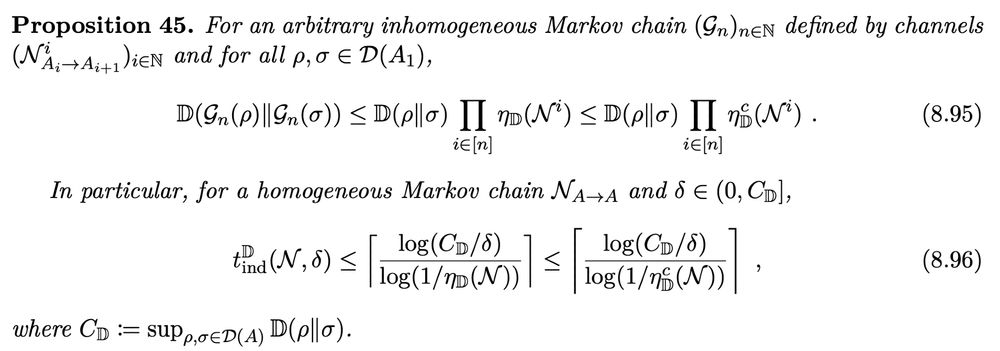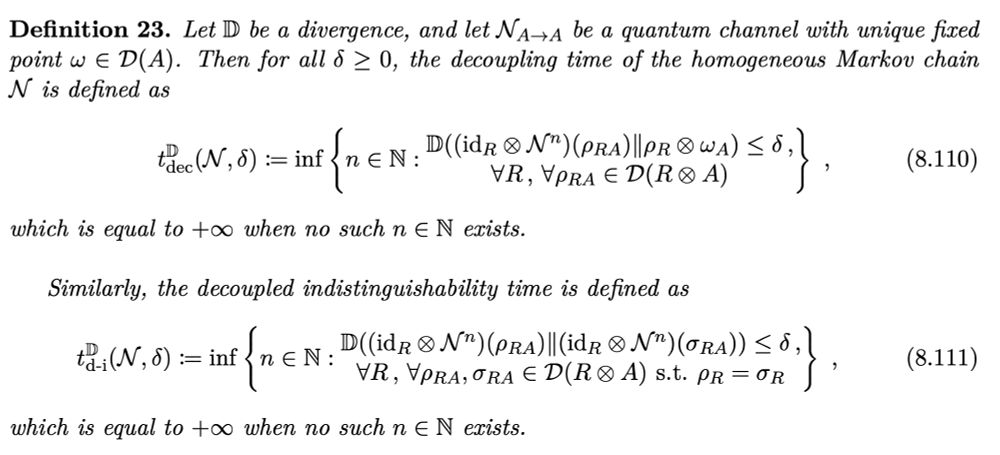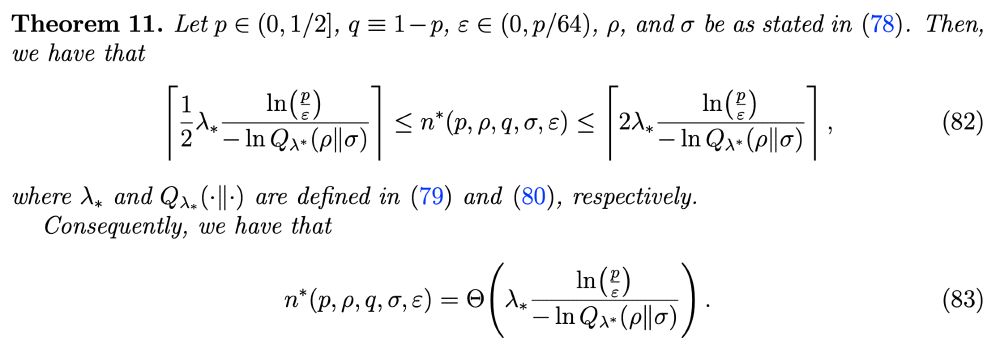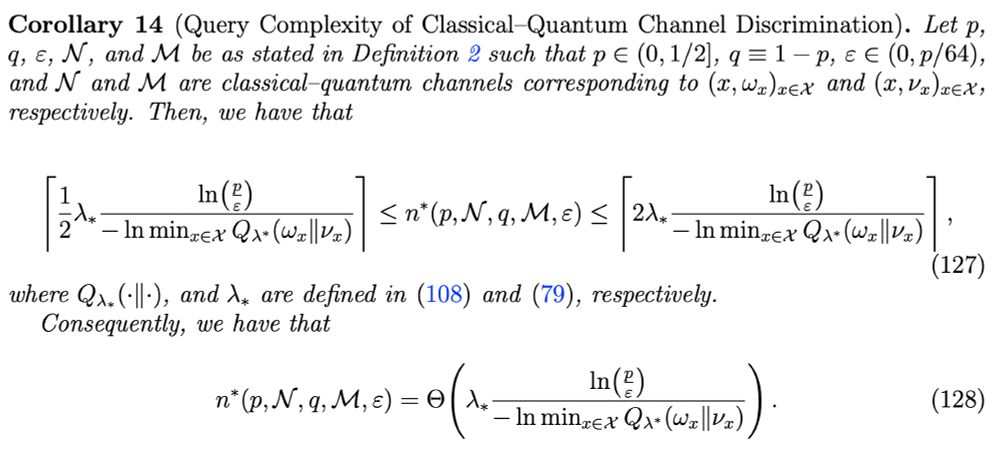
Mark M. Wilde
@markwilde.bsky.social
Associate Professor at Cornell University
quantum Shannon theory, quantum information theory, quantum error correction, quantum communication, quantum algorithms, quantum computational complexity theory, quantum machine learning
quantum Shannon theory, quantum information theory, quantum error correction, quantum communication, quantum algorithms, quantum computational complexity theory, quantum machine learning
I woke up this morning to see that @ccanonne.github.io has won a measly grant. Congrats! :)

November 9, 2025 at 11:08 AM
I woke up this morning to see that @ccanonne.github.io has won a measly grant. Congrats! :)
Physical Review has indicated in a paper proof that they have their own style for author contribution statements. This style consists of massacring our statement, by repeating "formal analysis" multiple times & unnecessarily capitalizing phrases. Why does APS consistently have such poor copyediting?


November 7, 2025 at 2:00 AM
Physical Review has indicated in a paper proof that they have their own style for author contribution statements. This style consists of massacring our statement, by repeating "formal analysis" multiple times & unnecessarily capitalizing phrases. Why does APS consistently have such poor copyediting?
here is what I see when I want to look up research papers on @nature.com 's web site. Why do I need to see ads like this? really??? Do you not get enough money from charging authors exorbitant publication fees? This is really pathetic.

November 1, 2025 at 10:19 AM
here is what I see when I want to look up research papers on @nature.com 's web site. Why do I need to see ads like this? really??? Do you not get enough money from charging authors exorbitant publication fees? This is really pathetic.
Joint work with Kaiyuan Ji and Seth Lloyd now available at
arxiv.org/abs/2509.08965
This paper identifies the communication capacity for sending information from the future to the past through a noisy closed timelike curve. The formula is reminiscent of mutual info but in general can be larger.
arxiv.org/abs/2509.08965
This paper identifies the communication capacity for sending information from the future to the past through a noisy closed timelike curve. The formula is reminiscent of mutual info but in general can be larger.



September 12, 2025 at 5:27 PM
Joint work with Kaiyuan Ji and Seth Lloyd now available at
arxiv.org/abs/2509.08965
This paper identifies the communication capacity for sending information from the future to the past through a noisy closed timelike curve. The formula is reminiscent of mutual info but in general can be larger.
arxiv.org/abs/2509.08965
This paper identifies the communication capacity for sending information from the future to the past through a noisy closed timelike curve. The formula is reminiscent of mutual info but in general can be larger.
Quiz: Who is the scientist on the left whose name is well known in quantum information theory?

August 21, 2025 at 12:06 PM
Quiz: Who is the scientist on the left whose name is well known in quantum information theory?
Here is what we did this summer:
arxiv.org/abs/2508.09103
All students in attached image are in 1st year undergrad or high school. Due to frozen funds, some volunteered & others were funded by Cornell Engineering. Thanks for your dedication & thx to other coauthors for helping to complete the work
arxiv.org/abs/2508.09103
All students in attached image are in 1st year undergrad or high school. Due to frozen funds, some volunteered & others were funded by Cornell Engineering. Thanks for your dedication & thx to other coauthors for helping to complete the work

August 13, 2025 at 8:25 PM
Here is what we did this summer:
arxiv.org/abs/2508.09103
All students in attached image are in 1st year undergrad or high school. Due to frozen funds, some volunteered & others were funded by Cornell Engineering. Thanks for your dedication & thx to other coauthors for helping to complete the work
arxiv.org/abs/2508.09103
All students in attached image are in 1st year undergrad or high school. Due to frozen funds, some volunteered & others were funded by Cornell Engineering. Thanks for your dedication & thx to other coauthors for helping to complete the work
My colleagues and I have issued an update of our paper:
arxiv.org/abs/2412.02134
New title: Sample-based Hamiltonian and Lindbladian simulation: Non-asymptotic analysis of sample complexity
Updated results summarized in attached table
arxiv.org/abs/2412.02134
New title: Sample-based Hamiltonian and Lindbladian simulation: Non-asymptotic analysis of sample complexity
Updated results summarized in attached table

August 13, 2025 at 3:59 PM
My colleagues and I have issued an update of our paper:
arxiv.org/abs/2412.02134
New title: Sample-based Hamiltonian and Lindbladian simulation: Non-asymptotic analysis of sample complexity
Updated results summarized in attached table
arxiv.org/abs/2412.02134
New title: Sample-based Hamiltonian and Lindbladian simulation: Non-asymptotic analysis of sample complexity
Updated results summarized in attached table
Ian George, @christophhirche.bsky.social, Theshani Nuradha, & I have issued an update of our q. Doeblin coefficients paper:
arxiv.org/abs/2503.22823
Main changes consist of an expanded section 8.5 on mixing, indistinguishability, & decoupling times of quantum Markov chains. See attached images
arxiv.org/abs/2503.22823
Main changes consist of an expanded section 8.5 on mixing, indistinguishability, & decoupling times of quantum Markov chains. See attached images




July 8, 2025 at 9:09 AM
Ian George, @christophhirche.bsky.social, Theshani Nuradha, & I have issued an update of our q. Doeblin coefficients paper:
arxiv.org/abs/2503.22823
Main changes consist of an expanded section 8.5 on mixing, indistinguishability, & decoupling times of quantum Markov chains. See attached images
arxiv.org/abs/2503.22823
Main changes consist of an expanded section 8.5 on mixing, indistinguishability, & decoupling times of quantum Markov chains. See attached images
Theshani Nuradha & I issued an important update of our paper on query complexity of q. channel discrimination:
arxiv.org/abs/2504.12989
Building on arxiv.org/abs/2506.13686, we gave a tight characterization of sample complexity of state discrimination & query complexity of cq channels. See images
arxiv.org/abs/2504.12989
Building on arxiv.org/abs/2506.13686, we gave a tight characterization of sample complexity of state discrimination & query complexity of cq channels. See images


July 3, 2025 at 2:12 PM
Theshani Nuradha & I issued an important update of our paper on query complexity of q. channel discrimination:
arxiv.org/abs/2504.12989
Building on arxiv.org/abs/2506.13686, we gave a tight characterization of sample complexity of state discrimination & query complexity of cq channels. See images
arxiv.org/abs/2504.12989
Building on arxiv.org/abs/2506.13686, we gave a tight characterization of sample complexity of state discrimination & query complexity of cq channels. See images
Congrats to Theshani Nuradha on a successful PhD thesis defense for Cornell ECE!
arxiv.org/search/quant...
arxiv.org/search/quant...


May 23, 2025 at 3:30 AM
Congrats to Theshani Nuradha on a successful PhD thesis defense for Cornell ECE!
arxiv.org/search/quant...
arxiv.org/search/quant...
Congrats to Soorya Rethinasamy on a successful PhD thesis defense for Cornell AEP!
arxiv.org/search/quant...
arxiv.org/search/quant...

May 21, 2025 at 11:42 PM
Congrats to Soorya Rethinasamy on a successful PhD thesis defense for Cornell AEP!
arxiv.org/search/quant...
arxiv.org/search/quant...
Group photo at Myers Point in Ithaca, NY

May 21, 2025 at 11:39 PM
Group photo at Myers Point in Ithaca, NY
Congrats to Vishal Singh on a successful PhD thesis defense for Cornell AEP!
arxiv.org/search/quant...
arxiv.org/search/quant...


May 21, 2025 at 7:26 PM
Congrats to Vishal Singh on a successful PhD thesis defense for Cornell AEP!
arxiv.org/search/quant...
arxiv.org/search/quant...
We even invented a quantum Doeblin coefficient dedicated to our colleague Xin Wang @wangxinfelix.bsky.social, by using a technique from PhD thesis work (see attached image). The benefit of this technique is that the resulting quantity is multiplicative.

April 1, 2025 at 3:28 PM
We even invented a quantum Doeblin coefficient dedicated to our colleague Xin Wang @wangxinfelix.bsky.social, by using a technique from PhD thesis work (see attached image). The benefit of this technique is that the resulting quantity is multiplicative.
Joint work w/ Ian George, Christoph Hirche @christophhirche.bsky.social, & Theshani Nuradha "Quantum Doeblin Coefficients: Interpretations and Applications":
arxiv.org/abs/2503.22823
Great collaboration & enjoyable project!
Interpretations of q. Doeblin coefficients in attached tables
arxiv.org/abs/2503.22823
Great collaboration & enjoyable project!
Interpretations of q. Doeblin coefficients in attached tables


April 1, 2025 at 3:11 PM
Joint work w/ Ian George, Christoph Hirche @christophhirche.bsky.social, & Theshani Nuradha "Quantum Doeblin Coefficients: Interpretations and Applications":
arxiv.org/abs/2503.22823
Great collaboration & enjoyable project!
Interpretations of q. Doeblin coefficients in attached tables
arxiv.org/abs/2503.22823
Great collaboration & enjoyable project!
Interpretations of q. Doeblin coefficients in attached tables
Minjeong Song "Causal Classification of Spatiotemporal Quantum Correlations" #QuantumResources2025

March 22, 2025 at 12:12 AM
Minjeong Song "Causal Classification of Spatiotemporal Quantum Correlations" #QuantumResources2025
David Arvidsson-Shukur "Properties and Applications of the Kirkwood-Dirac Distribution" #QuantumResources2025

March 22, 2025 at 12:12 AM
David Arvidsson-Shukur "Properties and Applications of the Kirkwood-Dirac Distribution" #QuantumResources2025
Clive Cenxin Aw "Irreversibility as the Dependence on Bayesian Priors" #QuantumResources2025

March 22, 2025 at 12:11 AM
Clive Cenxin Aw "Irreversibility as the Dependence on Bayesian Priors" #QuantumResources2025
Seok Hyung Lie "Temporal correlation in quantum state as a resource" #QuantumResources2025

March 22, 2025 at 12:11 AM
Seok Hyung Lie "Temporal correlation in quantum state as a resource" #QuantumResources2025
Conference photo #QuantumResources2025

March 20, 2025 at 9:49 PM
Conference photo #QuantumResources2025
Xin Wang @wangxinfelix.bsky.social "Amortized Stabilizer R’enyi Entropy of quantum dynamics" #QuantumResources2025
arxiv.org/abs/2409.06659
arxiv.org/abs/2409.06659

March 20, 2025 at 9:46 PM
Xin Wang @wangxinfelix.bsky.social "Amortized Stabilizer R’enyi Entropy of quantum dynamics" #QuantumResources2025
arxiv.org/abs/2409.06659
arxiv.org/abs/2409.06659
Kun Fang "Generalized quantum asymptotic equipartition" #QuantumResources2025
arxiv.org/abs/2411.04035
arxiv.org/abs/2502.15659
arxiv.org/abs/2411.04035
arxiv.org/abs/2502.15659

March 20, 2025 at 9:44 PM
Kun Fang "Generalized quantum asymptotic equipartition" #QuantumResources2025
arxiv.org/abs/2411.04035
arxiv.org/abs/2502.15659
arxiv.org/abs/2411.04035
arxiv.org/abs/2502.15659
Gelo Noel M. Tabia @gelonoel.bsky.social "Super-activating quantum memory by entanglement-breaking channels" #QuantumResources2025
arxiv.org/abs/2410.13499
arxiv.org/abs/2410.13499

March 20, 2025 at 9:41 PM
Gelo Noel M. Tabia @gelonoel.bsky.social "Super-activating quantum memory by entanglement-breaking channels" #QuantumResources2025
arxiv.org/abs/2410.13499
arxiv.org/abs/2410.13499
Masahito Hayashi "Generalized Quantum Stein’s Lemma and Second Law of Quantum Resource Theories" #QuantumResources2025

March 20, 2025 at 12:04 AM
Masahito Hayashi "Generalized Quantum Stein’s Lemma and Second Law of Quantum Resource Theories" #QuantumResources2025
Leonard Sikorski "Cost of quantum secret key" #QuantumResources2025
resource theory of secret key presented with several open questions posed to the community during the talk
for example, is the key of formation an entanglement monotone?
resource theory of secret key presented with several open questions posed to the community during the talk
for example, is the key of formation an entanglement monotone?

March 18, 2025 at 6:45 PM
Leonard Sikorski "Cost of quantum secret key" #QuantumResources2025
resource theory of secret key presented with several open questions posed to the community during the talk
for example, is the key of formation an entanglement monotone?
resource theory of secret key presented with several open questions posed to the community during the talk
for example, is the key of formation an entanglement monotone?

